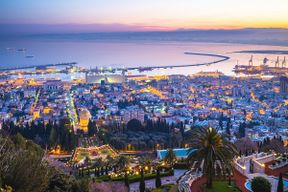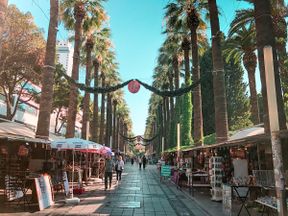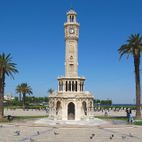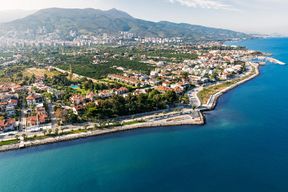Difference between revisions of "Mažatarisav"
| Line 119: | Line 119: | ||
'''Mažatarisav'''({{small|[[Siyan]]:}} [Maʒatarɪsɐv]), also known as Mažav as local slang in the modern age, is a metropolitan city in the northern island of the province of Ževuzah. The city has a population of 1.122 million in its urban center, making it Lenezan's fifth-largest city after Afąván, Doremarah, Ihana, and Duzunaduro. | '''Mažatarisav'''({{small|[[Siyan]]:}} [Maʒatarɪsɐv]), also known as Mažav as local slang in the modern age, is a metropolitan city in the northern island of the province of Ževuzah. The city has a population of 1.122 million in its urban center, making it Lenezan's fifth-largest city after Afąván, Doremarah, Ihana, and Duzunaduro. | ||
Mažatarisav has more than 2,500 years of recorded urban history, and up to 5,500 years of history as a human settlement since the Neolithic period. Their interactions have first been recorded around 105 CE, by Letsatian traders who've begun a material exchange with the islanders. A small Letsatian outpost would be there to cement authority for a short time before soldiers were retrieved prior to collapse, hence the reasoning behind it's previous name: Bẽnastúϑita ( | Mažatarisav has more than 2,500 years of recorded urban history, and up to 5,500 years of history as a human settlement since the Neolithic period. Their interactions have first been recorded around 105 CE, by Letsatian traders who've begun a material exchange with the islanders. A small Letsatian outpost would be there to cement authority for a short time before soldiers were retrieved prior to collapse, hence the reasoning behind it's previous name: Bẽnastúϑita (East Order). Iovism and Pashaism would be introduced to the Ževuzah islands, allowing the religions to thrive there for centuries until anti-foreigner sentiments from the Yeshub caused the expulsion/conversion of hundreds of thousands in the early 1400s. The island would be incorporated soon after into the Kingdom of Lenezan in 1405, and renamed to Mažatarisav (Tower On The Island) as a part of Siyanizing the region. However the name Bẽnastúϑita would be in use throughout many Ekuosian maps, namely Terminian, until the mid-1600s. Lying on an advantageous location at the center of the Gulf of Sharkunen, it is usused as a mercantile city and waypoint for much of it's history. It was between the Vos port city of Tameyvah and the Lugid capital city of Nataliya. | ||
As of 2016, it shares a major seaport for Lenezan with it's sister island to the south, Doremarah. It also shares the respected academic institution of the Siyan University of Doremarah and Mažatarisav, which remains a top-ranked university in mathematics, literature, and lingustics within Lenezan and Vaniua. The city still plays an important role to the Lenezi economy, due to it being a center of shipbuilding and commerce. It also hosts the Âr Kvisåne games, and draws in nearly a billion dollars from gambling/tourism. It holds an infamous title in the region, as it is one of the only places in Vaniua where it is legal to gamble and/or run a casino due to a legislative loophole. As a result, it's also a favorite spot to host the Loleno Yunuḍe â zur Âr Kvisåno's (International Federation for the Golden Races) biennial horseracing tournaments. | As of 2016, it shares a major seaport for Lenezan with it's sister island to the south, Doremarah. It also shares the respected academic institution of the Siyan University of Doremarah and Mažatarisav, which remains a top-ranked university in mathematics, literature, and lingustics within Lenezan and Vaniua. The city still plays an important role to the Lenezi economy, due to it being a center of shipbuilding and commerce. It also hosts the Âr Kvisåne games, and draws in nearly a billion dollars from gambling/tourism. It holds an infamous title in the region, as it is one of the only places in Vaniua where it is legal to gamble and/or run a casino due to a legislative loophole. As a result, it's also a favorite spot to host the Loleno Yunuḍe â zur Âr Kvisåno's (International Federation for the Golden Races) biennial horseracing tournaments. | ||
Revision as of 19:55, 2 April 2022
Mažatarisav | |
|---|---|
Metropolis | |
Top to Bottom, Left to Right: View of Uptown Mažatarisav at night, Zebave Botanical Shrines , Vukahętah Street in Ňepo Síyezan, Bíkava Palm Farmer's Market, View of Mažatarisav Marine District, Mažatarisav Square Clock Tower in Downtown Mažatarisav, Aerial View of Central Mažatarisav | |
| Etymology: Tower on the Island | |
| Nickname(s): The Elder Twin | |
| Country | Lenezan |
| Region | Islands |
| Area | |
| • Metro | 1,004 km2 (388 sq mi) |
| Population (2019) | |
| • Metropolis | 1,122,450 |
| • Density | 1,541/km2 (3,990/sq mi) |
| Demonym(s) | Mažatarisavi |
| Time zone | Sahar Coordinated Time (SCT+2) |
Mažatarisav(Siyan: [Maʒatarɪsɐv]), also known as Mažav as local slang in the modern age, is a metropolitan city in the northern island of the province of Ževuzah. The city has a population of 1.122 million in its urban center, making it Lenezan's fifth-largest city after Afąván, Doremarah, Ihana, and Duzunaduro.
Mažatarisav has more than 2,500 years of recorded urban history, and up to 5,500 years of history as a human settlement since the Neolithic period. Their interactions have first been recorded around 105 CE, by Letsatian traders who've begun a material exchange with the islanders. A small Letsatian outpost would be there to cement authority for a short time before soldiers were retrieved prior to collapse, hence the reasoning behind it's previous name: Bẽnastúϑita (East Order). Iovism and Pashaism would be introduced to the Ževuzah islands, allowing the religions to thrive there for centuries until anti-foreigner sentiments from the Yeshub caused the expulsion/conversion of hundreds of thousands in the early 1400s. The island would be incorporated soon after into the Kingdom of Lenezan in 1405, and renamed to Mažatarisav (Tower On The Island) as a part of Siyanizing the region. However the name Bẽnastúϑita would be in use throughout many Ekuosian maps, namely Terminian, until the mid-1600s. Lying on an advantageous location at the center of the Gulf of Sharkunen, it is usused as a mercantile city and waypoint for much of it's history. It was between the Vos port city of Tameyvah and the Lugid capital city of Nataliya.
As of 2016, it shares a major seaport for Lenezan with it's sister island to the south, Doremarah. It also shares the respected academic institution of the Siyan University of Doremarah and Mažatarisav, which remains a top-ranked university in mathematics, literature, and lingustics within Lenezan and Vaniua. The city still plays an important role to the Lenezi economy, due to it being a center of shipbuilding and commerce. It also hosts the Âr Kvisåne games, and draws in nearly a billion dollars from gambling/tourism. It holds an infamous title in the region, as it is one of the only places in Vaniua where it is legal to gamble and/or run a casino due to a legislative loophole. As a result, it's also a favorite spot to host the Loleno Yunuḍe â zur Âr Kvisåno's (International Federation for the Golden Races) biennial horseracing tournaments.






